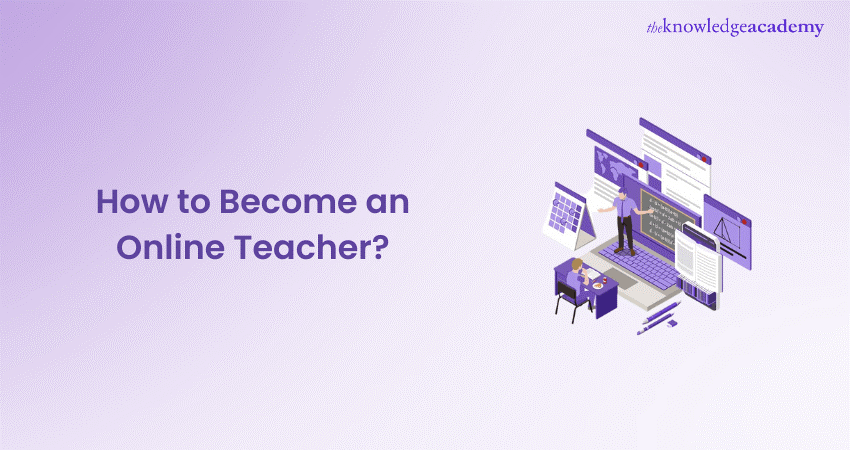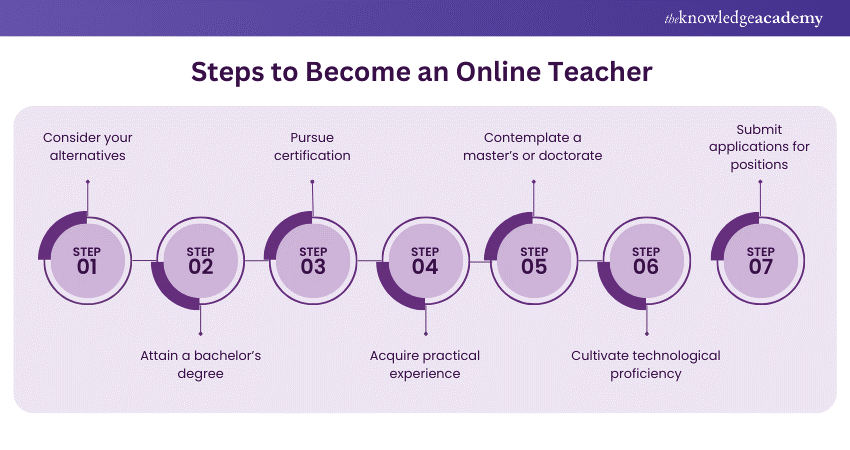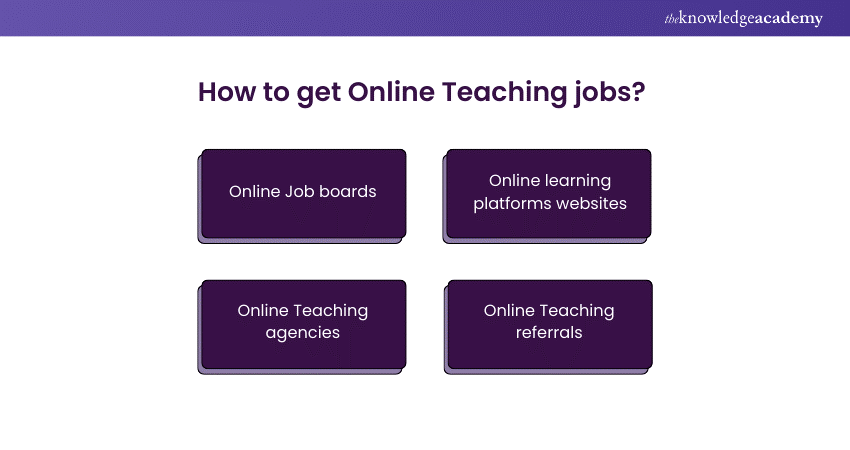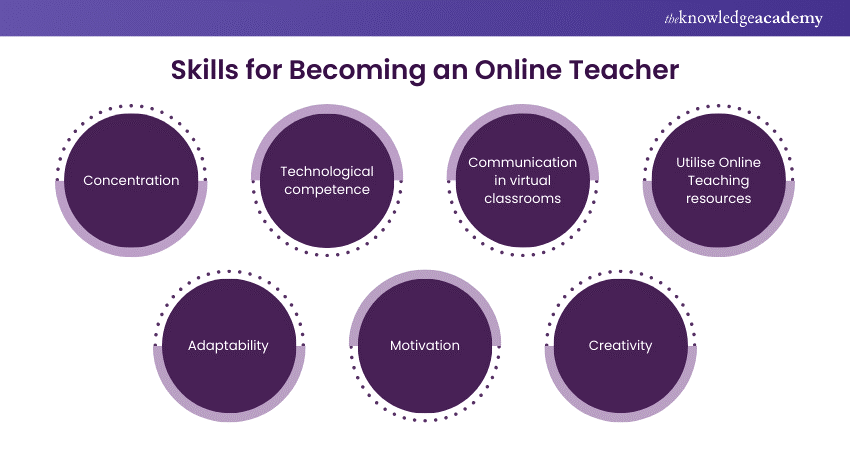We may not have the course you’re looking for. If you enquire or give us a call on 0800 446148 and speak to our training experts, we may still be able to help with your training requirements.
Training Outcomes Within Your Budget!
We ensure quality, budget-alignment, and timely delivery by our expert instructors.

Are you passionate about teaching and learning? Do you want to share your knowledge and skills with students from different backgrounds and locations? Then, Online Teaching would be perfect for you. You can teach various subjects and levels, work for different organisations, and use online platforms and tools. But How to Become an Online Teacher?
In this blog, we will answer these questions and more and provide a step-by-step guide on How to Become an Online Teacher.
Table of Contents
1) Steps to Become an Online Teacher
a) Consider your alternatives
b) Attain a bachelor's degree
c) Pursue certification
d) Acquire practical experience
e) Contemplate a master's or doctorate
f) Cultivate technological proficiency
g) Submit applications for positions
2) Skills for Becoming an Online Teacher
3) Conclusion
Steps to Become an Online Teacher
Becoming an Online Teacher is not as difficult as you might think, but it does require some planning and preparation. Here are the main steps on How to Become an Online Teacher:

Consider your alternatives
Before pursuing Online Teaching as a career, you should consider your alternatives and weigh the pros and cons of Online Teaching versus traditional teaching. Online Teaching has many benefits, such as flexibility, convenience, diversity, and autonomy, but it also has some challenges, such as isolation, technical issues, competition, and lack of social interaction.
You should also consider your personal and professional goals and how Online Teaching fits them. For example, do you want to teach online full-time or part-time? Do you want to teach online as a supplement to your income or as your main source of income? Do you want to teach online as a long-term career or as a temporary option?
Attain a bachelor’s degree.
The minimum qualification for most Online Teaching jobs is a bachelor’s degree in the subject you want to teach. However, some Online Teaching jobs may require a higher level of education, such as a master’s or a doctorate, especially for teaching at the university level.
Therefore, you should research the requirements and expectations of the Online Teaching jobs you are interested in and plan your education accordingly. You should also choose a degree that is relevant and recognised in the field of Online Teaching and that provides you with the necessary knowledge and skills to teach effectively online.
Pursue certification
Beyond a bachelor’s degree, you might also require a teaching certification or licensure to instruct online, contingent upon the specific type and level of Online Teaching you aspire to undertake.
For example, suppose you want to teach online for a public school or a college. In that case, you may need to have a state-issued teaching certification or a licence, which usually involves completing a teacher preparation programme and passing a series of exams. If you want to teach online for a private school or an online learning platform, you may not need a formal certification or a licence, but you may need to have a certificate or a diploma in Online Teaching, which usually involves completing a short course or a programme that covers the basics of Online Teaching methods, tools, and best practices.
Acquire practical experience
One of the best ways to prepare yourself for Online Teaching is to gain some practical experience in teaching online. It will help you develop your Online Teaching skills, build your Online Teaching portfolio, and increase your chances of getting hired for Online Teaching jobs. There are many ways to gain practical experience in Online Teaching, such as:
a) Volunteering for Online Teaching projects or initiatives, such as tutoring, mentoring, or coaching online learners, or creating and delivering online courses or workshops for non-profit organisations or communities.
b) Taking Online Teaching courses or programmes, such as massive open online courses, webinars, or podcasts, offers opportunities for peer feedback, collaboration, and assessment.
c) Joining Online Teaching communities or networks, such as forums, blogs, or social media groups, offers support, advice, and resources for Online Teachers and allows you to connect and interact with other Online Teachers and learners.
d) Apply for Online Teaching internships or apprenticeships, such as those offered by online learning platforms, schools, or colleges, that provide you with hands-on training, guidance, and supervision in Online Teaching.
Contemplate a master’s or doctorate.
To enhance your Online Teaching career, you might consider pursuing a master’s or doctoral degree in Online Teaching or a relevant field like educational technology, instructional design, or curriculum development. A master’s or a doctorate degree can help you deepen your Online Teaching knowledge and skills, enhance your Online Teaching credibility and authority, and open up more opportunities for Online Teaching jobs, especially at the higher education level.
A master’s or doctoral degree is not mandatory for Online Teaching, and it might not be the right fit for everyone due to the substantial commitment of time, finances, and energy it entails. Therefore, you should weigh the benefits and costs of pursuing a master’s or a doctorate degree and decide if it aligns with your Online Teaching goals and aspirations.
Cultivate technological proficiency
One of the essential skills for Online Teaching is technological proficiency, which means being able to use various Online Teaching platforms and tools effectively and efficiently. Online Teaching platforms and tools are the means through which you deliver your Online Teaching content and instruction and communicate and interact with your online learners.
Therefore, you should familiarise yourself with the Online Teaching platforms and tools that are commonly used in your field and level of Online Teaching. You can learn how to use them to create engaging, interactive, and accessible online learning experiences. Some of the Online Teaching platforms and tools you should know how to use are:
a) Learning Management Systems (LMS), such as Moodle, Canvas, or Blackboard, are software applications that allow you to create, manage, and deliver online programmes and courses and track and assess online learners’ progress and performance.
b) Video conferencing tools, such as Zoom, Skype, or Google Meet, are software applications. These applications allow you to conduct live online classes, lectures, or meetings and share your screen, audio, and video with your online learners.
c) Presentation tools, such as PowerPoint, Prezi, or Google Slides, are software applications. These applications allow you to create and display Online Teaching slides, animations, or graphics and add voice-over, narration, or captions to your Online Teaching presentations.
d) Assessment tools, such as Google Forms, Quizlet, or Kahoot, are software applications. These applications allow you to create and administer online quizzes, tests, or surveys and collect and analyse online learners’ responses and feedback.
e) Collaboration tools, such as Google Docs, Padlet, or Flipgrid, are software applications. These applications allow you to create and share online documents, boards, or videos and enable online learners to work together, comment, or respond to your Online Teaching activities or assignments.
Submit applications for positions.
The final step to becoming an Online Teacher is to submit applications for Online Teaching jobs that match your qualifications, skills, and interests. There are many sources and platforms where you can find and apply for Online Teaching jobs, such as:

a) Online job boards or websites, such as Indeed, Glassdoor, or LinkedIn, are online platforms that list and advertise various Online Teaching jobs from different organisations and employers and allow you to upload your resume, cover letter, and portfolio and apply for Online Teaching jobs directly or through links.
b) Online learning platforms or websites offer online courses and programmes in various subjects and levels and allow you to create and sell your own online courses or join their Online Teaching teams or networks.
c) Online Teaching agencies or companies provide Online Teaching services and solutions to various clients and learners and recruit and hire Online Teachers for various Online Teaching projects or contracts.
d) Online Teaching referrals or recommendations, which are online or offline sources of information or contacts that can help you find and apply for Online Teaching jobs, such as Online Teaching communities, networks, or forums, Online Teaching mentors, coaches, or peers, or Online Teaching clients, learners, or alumni.
When you submit applications for Online Teaching jobs, you should make sure that you tailor your resume, cover letter, and portfolio to the Online Teaching job and organisation you are applying for and highlight your Online Teaching qualifications, skills, and achievements.
You should also prepare yourself for the Online Teaching interview process, which may involve Online Teaching demonstrations, tests, or trials, and showcase your Online Teaching personality, style, and methods.
Measure your team’s performance effectively by signing up for our Managing Virtual Teams Course now!
Skills for Becoming an Online Teacher
Besides the steps mentioned above, becoming an Online Teacher also requires developing and honing some specific skills that are essential for Online Teaching success. Here are some of the most important skills for becoming an Online Teacher:

Concentration
Concentration is the ability to focus your attention and energy on your Online Teaching tasks and goals and avoid distractions and interruptions. Concentration is important for Online Teaching because it helps you maintain your Online Teaching quality and productivity and cope with the challenges and demands of Online Teaching.
To improve your concentration, you should create and follow a regular Online Teaching schedule and routine, eliminate or minimise potential Online Teaching distractions and interruptions, such as phone calls, emails, or notifications. You can also take frequent breaks and rest to recharge your Online Teaching energy and focus.
Technological competence
Technological competence is the ability to use various Online Teaching platforms and tools effectively and efficiently. Technological competence is important for Online Teaching because it enables you to create and deliver engaging, interactive, and accessible online learning experiences, as well as communicate and interact with your online learners.
To develop your technological competence, you should familiarise yourself with the Online Teaching platforms and tools that are commonly used in your field and level of Online Teaching. Also, you can earn how to use them to create Online Teaching slides, videos, quizzes, assignments, and feedback.
Communication in virtual classrooms
Communication in virtual classrooms is the ability to convey your Online Teaching content and instruction clearly and concisely and to listen and respond to your online learners’ questions, comments, and feedback. Communication in virtual classrooms is important for Online Teaching because it helps you establish rapport and trust with your online learners and facilitates their learning and understanding.
To improve your communication in virtual classrooms, you should use simple and direct language, voice-over, narration, or captions to enhance your Online Teaching presentations, use emoticons, emojis, or gifs to express your Online Teaching personality and emotions
Utilise Online Teaching resources
Utilising Online Teaching resources is the ability to find and use various Online Teaching resources that can support and enrich your Online Teaching content and instruction. Online Teaching resources are online sources of information or materials that can help you plan, prepare, and deliver your Online Teaching, such as Online Teaching courses, programmes, communities, networks, forums, blogs, podcasts, webinars, or books.
To utilise Online Teaching resources, you should research and evaluate the quality and relevance of the Online Teaching resources you find and integrate them into your Online Teaching curriculum, syllabus, or lesson plans. You should also cite and acknowledge the Online Teaching resources you use and respect their intellectual property rights.
Adaptability
Adaptability is the ability to adjust and modify your Online Teaching content and instruction according to the needs, preferences, and feedback of your online learners and the changes and challenges of the Online Teaching environment. Adaptability is important for Online Teaching because it helps you cater to the diversity and individuality of your online learners and cope with the uncertainty and unpredictability of Online Teaching.
To enhance your adaptability, you should solicit and incorporate your online learners’ feedback and suggestions, use data and analytics to monitor. You can also evaluate your Online Teaching effectiveness with new Online Teaching methods, tools, and resources.
Motivation
Motivation involves the skill to motivate and empower your online learners, encouraging active engagement and participation in your Online Teaching, ultimately facilitating the attainment of their learning objectives and goals. Motivation is important for Online Teaching because it helps you overcome the barriers and challenges of Online Teaching, such as lack of social presence, interaction, and support. It increases your online learners’ satisfaction and retention.
To boost your motivation, you should set clear and realistic Online Teaching and learning expectations and outcomes. Additionally, you can use gamification, rewards, or recognition to acknowledge and celebrate your online learners’ achievements and progress. You can create a supportive and positive Online Teaching and learning community and culture.
Creativity
Creativity entails the capacity to conceive and execute novel and inventive concepts and approaches in developing your Online Teaching materials and methods. Creativity is important for Online Teaching because it helps you differentiate and distinguish your Online Teaching from others and attract and retain your online learners’ attention and interest.
To foster your creativity, you should explore and experiment with different Online Teaching formats, styles, and media, such as podcasts, videos, blogs, or comics, and use storytelling, humour, or analogies. It can make your Online Teaching content and instruction more relatable and memorable.
Make your sessions more engaging by signing up for our Online Teacher Masterclass now!
Conclusion
Online Teaching is a rewarding and flexible career option for educators who want to share their knowledge and skills with learners worldwide. However, Online Teaching also requires some planning and preparation and specific skills and competencies. In this blog, we have provided you with a step-by-step guide on How to Become an Online Teacher and some of the most important skills for becoming an Online Teacher.
Elevate your writing skills today by joining our Online Writer or Editor Masterclass!
Frequently Asked Questions

You can teach online almost any subject and grade that you are qualified and certified for. Different online platforms may have different requirements and offerings, so you should check with them before applying.

An Online Teacher needs to have good communication skills, tech skills, creativity, adaptability, and time management skills. These skills help Online Teachers to deliver engaging and effective lessons, use various online tools and technologies, interact with students and parents, and plan and organise their work.

The Knowledge Academy takes global learning to new heights, offering over 30,000 online courses across 490+ locations in 220 countries. This expansive reach ensures accessibility and convenience for learners worldwide.
Alongside our diverse Online Course Catalogue, encompassing 17 major categories, we go the extra mile by providing a plethora of free educational Online Resources like News updates, Blogs, videos, webinars, and interview questions. Tailoring learning experiences further, professionals can maximise value with customisable Course Bundles of TKA.

The Knowledge Academy’s Knowledge Pass, a prepaid voucher, adds another layer of flexibility, allowing course bookings over a 12-month period. Join us on a journey where education knows no bounds.

The Knowledge Academy offers various Virtual Online Job Roles Training, including Managing Virtual Teams, Virtual Social Media Manager Training and more. These courses cater to different skill levels, providing comprehensive insights into the Top 10 Travel Agent Skills That You Must Have.
Our Business Skills Blogs cover a range of topics related to Online Teacher Training, offering valuable resources, best practices, and industry insights. Whether you are a beginner or looking to advance your Business Skills, The Knowledge Academy's diverse courses and informative blogs have you covered.
Upcoming Business Skills Resources Batches & Dates
Date
 Online Teacher Training
Online Teacher Training
Fri 3rd Jan 2025
Fri 28th Mar 2025
Fri 23rd May 2025
Fri 4th Jul 2025
Fri 5th Sep 2025
Fri 24th Oct 2025
Fri 5th Dec 2025







 Top Rated Course
Top Rated Course



 If you wish to make any changes to your course, please
If you wish to make any changes to your course, please


